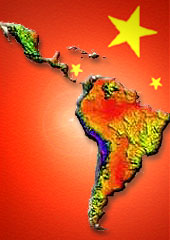 - Taylor Kirk*
- Taylor Kirk*Proponents of dependency theory as applied to Latin America’s relationship with the U.S. will have to re-route their radars to a new target: China. Having grown at lightning speed over the past several decades, China has recently courted Latin American leaders in an effort to secure access to much-needed raw materials. Though many, including most recently Venezuelan President Hugo Chávez, have called for measures to decrease economic dependence on the United States, little has actually been done to lessen the need for investment and aid from up north. China’s insatiable thirst for the commodities and manufactures Latin America has to offer gives the region an opportunity to spark a bidding war for its natural resources.
Starting with former Chinese President Jiang Zemin’s 12-day trip to Latin America in 2001, China’s government and businessmen (often one and the same) haved worked hard to cement relationships with the region’s leaders and business elite. From investing in Venezuelan and Brazilian oil fields, Chilean copper mines, or Cuban telecommunications equipment (i.e. spying technologies, if you believe wary US officials), China has developed partnerships with nearly every country south of the Rio Grande.
China’s growing economic clout is likely to remain a huge advantage for Latin American economies. With few exceptions, most economies are driven by commodity exports, whose prices have risen in response to soaring Chinese demand. Copper prices recently hit an all-time high, driven by the world’s largest copper consumer, China. The same story applies to oil and gas, an industry in which China has invested in Brazil and Venezuela. Chinese officials have indicated that they will make overtures to the new Bolivian government after elections in December.
In addition to a nearly perfectly matched economic relationship, Chinese interest in Latin America has given the region’s leaders a new trump card when dealing with their often disconcerting northern neighbor, the United States. After President Bush’s recent trip through South America left many Latin Americans less than impressed, calls for increased economic cooperation with other partners and within Latin America itself surfaced. Since the United States has been unwilling to reduce subsidies and make other concessions for equitable trade agreements, sellers of agricultural products and other raw materials have begun to look for markets elsewhere. China has run a trade deficit with the region for the last two years, according to a CRS Report for Congress.
After Bush’s visit to Latin America failed to generate positive opinion of himself and his country, U.S. policy makers began to examine the ways in which they might repair relations with their southern neighbors. The presence of China as an important trading partner, though not yet on the level of the United States, gives Latin American governments the chance to play one off another, to their benefit. Policy wonks are well aware of this, and the above-mentioned CRS Report and The Heritage Foundation have both called for a series of gestures to regain influence in what many derisively call ‘America’s backyard’. However, as the intensity of the protests greeting Bush in Argentina recently show, it may be a bit late.
*Image from The Globalist
3 comments:
Post a Comment